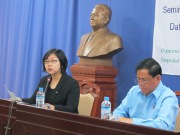Sowing seeds of Partnership in Laos in transition

|
Laos is a socialist country influenced strongly by Vietnam. Following its accession to ASEAN in 1997, serving as the chair for ASEAN in 2004 – 2005, the very recent success of hosting ASEM 9 and the near-future entry in WTO, the country has been more participating in ASEAN activities and gradually integrated into global economy. Since the introduction of the New Economic Mechanism in 1986, policies for privatization, the domestic economy, and trade liberalization have been promoted. As such, Laos has been making a gradual transition from a planned economy to a market economy and aims to free the country from the status as a LDC by 2020. The whole nation is full with spirit of accepting new ideas and concepts. The population exceeds 6 million with around 4 million workforce, among which 76% is in agriculture (76%) followed by Industry (8.6%) and Service sector (8.6%). Among others, service sector is rapidly growing and contributes to 37.3% of GDP. Trade union movement is lead by Lao Federation of Trade Unions (LFTU) and it urges companies to conclude collective agreements. UNI-LCJ with its decade-long experience to hold trade union educational seminars in cooperation with Vietnamese unions, has decided to launch 3-year project to hold such seminars to promote “Partnership Labor-Management Relationship” as early as possible in Laos in transition. The first seminar was held in Vientiane on 26 – 27 November 2012. Participants from post & telecom, finance, automobile and media sectors unions under the LFTU learnt roles and responsibilities of trade unions as well as employers, organizing and recruitment, with focus on collective bargaining especially wage negotiation in Japan and in Laos. “How trade unions can respond to opportunities and challenges to represent working people in the light and shadow of globalization?” LFTU has policies and roles to contribute to the development of well-balanced economy and bring the best out of workers by establishing unions in companies and solving problems through labor-management consultation. Japanese trade union experience through this bilateral exchange will be useful for Laos’ trade union development and mutual understandings. Head of UNI-LCJ delegation, Sis. Tomoko Terajima, JPGU observed that trade unions’ philosophy and efforts to represent workers on behalf of their rights and interests are the same in spite of different political, economic and trade union systems in both countries and concluded that trade union education for members and leaders are key to success. For pictures, visit Flickr |




